Dates: 27 MAY–10 JUNE 2007 (SUNDAY START)
Prize Money: €6,947,960
128 DRAW
SITE: STADE ROLAND GARROS
2 AVENUE GORDON BENNETT
75016 PARIS
SURFACE: RED CLAY
BALL: ROLAND GARROS – FRENCH OPEN
WEB SITE: http://www.rolandgarros.com/en_FR/index.html
DRAW
Marat will face a qualifier at the 1st round!!
 __________
__________2nd Round : Marat lost to Janko Tipsarevic(SRB)
| Janko Tipsarevic | 6 | 6 | 7 | |||
| Marat Safin | 4 | 4 | 5 |
![[image]](http://i45.photobucket.com/albums/f57/Ysegaia/Marat%202007/marat.jpg) | ||||
In text: http://www.rolandgarros.com/en_FR/news/interviews/2007-05-30/200705301180536554875.html
Q. What would you say to your fans, you have lots of fans who might be disappointed today.
MARAT SAFIN: Well, life goes on, and unfortunately they wasn't really the matches that I should have lost. It's in second round only. I guess there will be another chance and I'll play better. The luck will be on my side.
But unfortunately right now, I feel like something doesn't come together, and that's why it's a lot of sad losses for the past, from beginning of the year.
Q你要跟球迷說什麼呢﹐今天你廣大的球迷們應該會很失望
MS 嗯﹐日子還是要過下去阿﹐很不幸﹐今天這比賽實在不該輸的﹐才第二輪而已。我想以後還有機會能表現好一點吧。總有一天﹐幸運之神會眷顧的。
現在真的很糟﹐我覺得不知道怎麼回事整個狀況都無法改善﹐所以從年初至今﹐一直在面對一堆殘酷難堪的失敗。
Q. Did you get some trouble with the conditions, the rain and everything, or it's not a matter?
MARAT SAFIN: Well, it doesn't really matter, because I think it's ‑‑ we are professionals and been playing in such conditions really for many years, different tournaments. To complain about the weather doesn't really make any sense.
Q 是否是現場情況不適應﹐下雨或其他因素﹐還是那都不是原因
MS 那都不是藉口﹐因為我們都是職業球員﹐多年來早已習慣各種情況變化了﹐抱怨天氣沒什麼意義
Q. Have you ever attended in a theater Hamlet?
MARAT SAFIN: No.
Q 你有沒有去看過哈姆雷特
MS 沒有
Q. The play Hamlet?
MARAT SAFIN: No, no, no.
Q 哈姆雷特劇?
MS NO NO NO
Q. Because there is a lot of interesting monologues and he's asking himself to be or not to be.
MARAT SAFIN: It's for me or ‑‑ this question?
Q 因為在劇本中有許多有趣的獨白﹐他在質疑自己要成功還是不要
MS 這是問我的問題嗎﹐還是?
Q. Could be, because I listen to many monologues of you today and it remind me of Hamlet.
MARAT SAFIN: Well, I'm 27 years old, and I'm already downhill on my career. So it's not really a question to be or not to be. This kind of question will be at age of 22, without winning a Grand Slam, and being somewhere up close, but never actually achieve anything, like Rios, for example. That's a question for him.
Q 算是吧﹐今天在場上聽到你自己喃喃自語﹐讓我想起哈姆雷特。
MS 我已經27歲了﹐職業生涯在走下坡中﹐所以應該不是我想不想成功的問題吧。這種質疑在22歲仍未贏過大滿貫﹐但已經慢慢在起飛卻還沒有實際成就的人﹐好比 RIOS (前智利名將)。那是他應該問自己的問題。
Q. You seem very frustrated on the court. Is it because of your game or because of Tipsarevic?
MARAT SAFIN: No, well, everything, altogether. It really made me disappointed because I was very close to win the first set 3‑1, Love‑30. And he serve, slipped away, the set. And of course, he started to play much better, even though that I made a break the first game of second set.
And I was just a little bit sad that nothing came together. Like I said, nothing, it didn't click. And then I start to be a little bit scared and had a little bit of pressure. He started to play much better and he was feeling that I'm not playing my best tennis.
And altogether, I could analyze the situation, but I couldn't do anything against it. And that's why it was really frustrating for me.
Q 你在場上顯得很低潮沮喪﹐是因為自己狀態不好﹐還是對手的威脅
MS 不是﹐嗯﹐應該說是整個發展情況。第一盤我3-1領先﹐還 0-30﹐而且是他發球﹐結果整盤竟然掉了﹐我真是失望透頂。之後他越打越順﹐即便第二盤一開始我又先破他發球局。
我難過因為狀態就是調整不好﹐就像我說的﹐沒有突破﹐像熄火一般。之後我開始緊張感受壓力﹐他跟著打得更好﹐當然也查覺我不在最佳狀態。
整個來說﹐我能清楚分析為何如此﹐但卻對逆轉情勢無能為力。這也是我為什麼如此難受的緣故。
Q. Do you really feel that you're on the way down?
MARAT SAFIN: Well, I don't know how many years you want me to play?
Q 你覺得自己狀態下滑中
MS WELL﹐我不曉得你還期望我再打幾年
Q. Five more.
Q 五年吧
MARAT SAFIN: Well, let's see the first, another couple of years, how it goes also. It also depends what the situation is going to be. Because I'm not really into playing between being around 50 in the world. It doesn't really motivate me to play good tennis and travel around the year. And the max we can make, second round, third round, and the position in the top 50. I make one semifinal somewhere in a small tournament and that's it. So it doesn't give me enough motivation to continue.
MS 嗯﹐我們先看看之後幾年怎麼樣吧﹐當然也取決於進步的情形。因為﹐我可不想排名50還在網壇掙扎﹐那樣的話我就毫無到處巡迴打出好球的熱情了--如果最多都只能打到第二輪﹐第三輪﹐在50名左右徘徊。今年以來我只有在一個小比賽打進四強而已﹐實在沒什麼動力繼續下去...
But if it doesn't really click and it doesn't really make any radical changes and nothing comes up, then I will see. Of course, there is a hope. Of course I want to play tennis, and it would be a sad situation to leave with being a struggling player. So I really hope that that can change and play another three, four years. Why not?
MS 如果我還是找不到節奏﹐也沒有重大突破﹐那麼我們就看著辦吧。當然﹐總是有希望的﹐我當然想打網球﹐如果因為狀態不好而黯然離開網壇是多傷感的事呢。所以﹐我真的祈盼有轉機﹐然後再打三﹑四年? 有何不可?
But those are ‑‑ depends on the mood. Maybe I don't want to play anymore next year, maybe in two years. I don't really know. But really, of course I wish to continue being not 24 in the world, being a little bit, at least, closer to the top 10.
MS 但那些都隨著心情而改變。也許明年我就不想打了﹐也許兩年後.....我真的不知道。但﹐真的﹐我真的想繼續打下去﹐而且不是停在世界第24﹐而是﹐至少接近前十。
Q. You had all the injury problems. Now you're healthy.
MARAT SAFIN: Yeah.
Q 你之前有種種傷勢問題﹐現在健康嗎
MS 是的
Q. So isn't it disappointing that you're healthy, no excuses, nothing and then ‑‑
MARAT SAFIN: Yeah, but it's tough, you know, because every time I get injured I was playing great tennis. I was 3 in the world; I got injured in the wrist. I was 3 in the world and I got injured with the knee after winning the Australian Open. So maybe that's the situation. But what can we do? Move on.
Q 這樣不是更令人失望﹐你很健康﹐沒有藉口﹐卻.....
MS 是阿﹐很困難的瓶頸﹐而且每當我打得好時就開始受傷。曾經世界第三﹐就傷了手腕。之後又重返第三﹐結果在贏得澳網後膝蓋又受傷。可能情況就是這樣吧﹐然而我們能怎麼辦呢? 只有往前走。
Q. Just a last question. You seem the last year or two maybe you have figured out grass a little bit.
MARAT SAFIN: That's one of the last hopes.
Q 最後一個小疑問。最近兩年你似乎對草地球場有些開竅了
MS 那大概是最後的希望了
Q. Do you think maybe now, maybe Wimbledon could be almost the best place for you because you have such a big game?
MARAT SAFIN: Well, I don't want to really put everything on all the pressure, because I have enough already on grass. Because also, I don't know what they gonna do with the seedings. They have own way of doing the seeding. So I don't know what's gonna happen there. Also I think I can play well there, and I will have good draw, I think I can manage.
Q 你會不會認為因為你的強大火力﹐也許溫網會是你的最佳福地
MS 嗯﹐我真的不想再自增壓力了﹐草地經驗也受夠了。還有﹐我不曉得他們怎麼決定種子球員。溫網有自己排種子的方式﹐不知道他們會如何處理。我想我能發揮不錯的﹐如果有個好簽﹐應該也有可為。
Last year I was close to beating Gonzalez, but I lost five sets. I don't feel anymore so uncomfortable like the years before. But looking right now in the situation that I am right now, I'm not really in the perfect conditions to make any big results. But maybe step by step, and if something gonna change on grass.
去年我差點打敗GONZALEZ﹐但卻五盤敗北﹐所以不像以前那麼討厭草地了。但看看現在的我﹐狀態不佳﹐無法打出好成績。也許﹐一步一步地﹐我能在草地找到轉機。
For the video-interview: http://www.rolandgarros.com/en_FR/multimedia/console/mflash.html?targetLink=/media/video/INT.safin.marat.30052007_EN_480 x360_400kbps.flv〈=en_FR&localisIE=true
___________
1st Round: Marat bt Fernando Vicente (ESP) 6.1 6.3 6.1
| Fernando Vicente | 1 | 3 | 1 | |||
| Marat Safin | 6 | 6 | 6 |
![[image]](http://i20.photobucket.com/albums/b233/Happiness_76/capt-60.jpg)
![[image]](http://i20.photobucket.com/albums/b233/Happiness_76/capt-61.jpg)
![[image]](http://i20.photobucket.com/albums/b233/Happiness_76/capt-62.jpg)
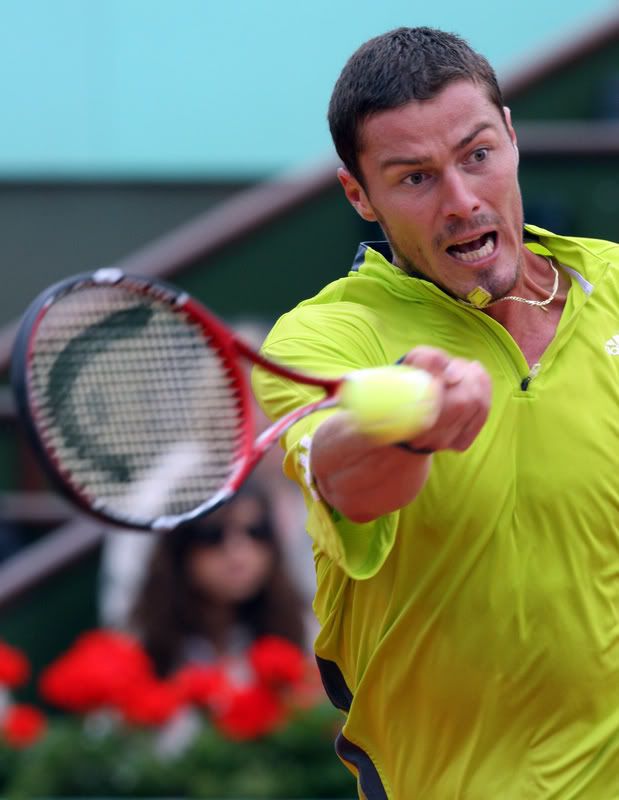
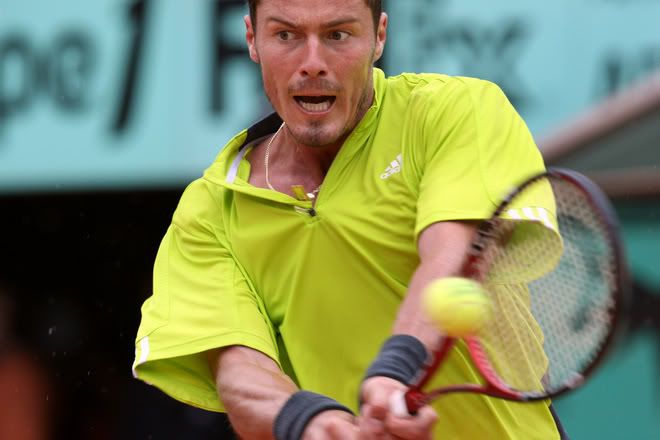
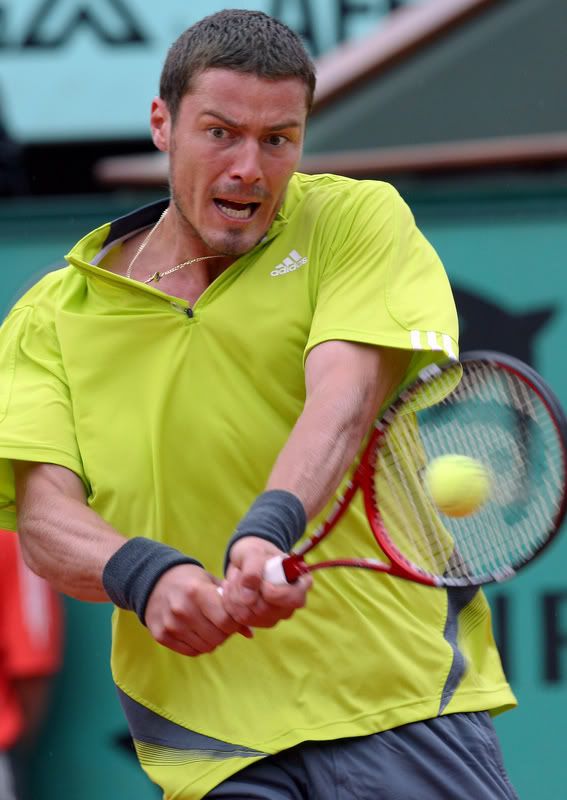
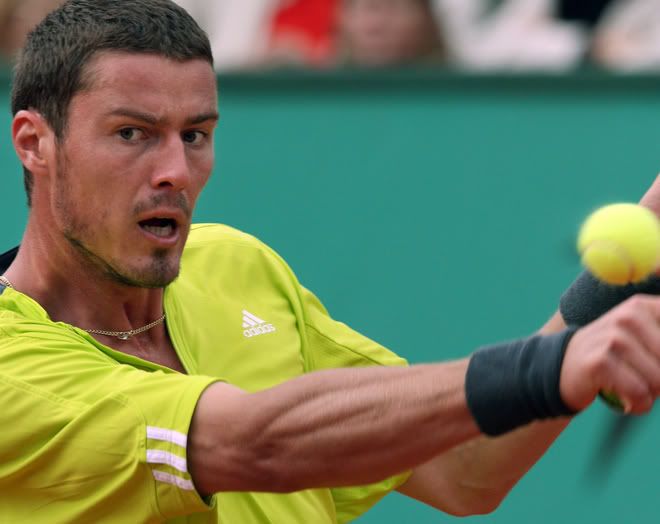
![[image]](http://d.yimg.com/us.yimg.com/p/rids/20070527/i/r2216640525.jpg)
![[image]](http://d.yimg.com/us.yimg.com/p/rids/20070527/i/r1765712742.jpg)
![[image]](http://d.yimg.com/us.yimg.com/p/rids/20070527/i/r3302183390.jpg)

Interview with Marat at EuroSport !! He looks so jolly and cute !!!!!!!
![[image]](http://img522.imageshack.us/img522/1753/safinrg013ty4.jpg)

 http://www.rolandgarros.com/en_FR/news/interviews/2007-05-27/200705271180293434765.html
http://www.rolandgarros.com/en_FR/news/interviews/2007-05-27/200705271180293434765.htmlDay 1 - An interview with Marat Safin - Sunday, May 27, 2007
Transcribed Interview
THE MODERATOR: Questions in English or French first. First question.
Q. Some 51 percent on the first serve, not a very high percent, but you were pretty heavy 217, 219. Is that something you're quite satisfied about to be very consistent with your ‑‑ for your service?
MARAT SAFIN: I'd rather change a little bit to make it a little bit higher percentage, a little bit lower on the speed. But was a little bit difficult, was a little bit windy. And of course the first match is kind of a little bit nervous. So it's not physical to do something very good because you want to win, you want to pass the first round. It's not easy.
Q. Your form on clay and the build‑up to the French Open has been sort of up and down. How easy is it for you to turn it on when it comes to a Grand Slam?
MARAT SAFIN: Well, it wasn't even ups and downs, it was just downhill. I didn't do anything special on the clay court. I lost a difficult match in the Monte Carlo, Rome and Hamburg. But here is a little bit different story because it's five sets, big tournament. I'm not ‑‑ a lot of things actually changes, because it gives me the opportunity, it gives me more confidence to play five sets, because even though you feel you're not playing well, you have enough time to catch up and start to play better and better. You have always a chance.
Q. How did winning the U.S. Open change your career in terms of confidence you just talked about?
MARAT SAFIN: Yeah, well, it's been such long time ago, so I even forgot about how it feels. And it's a really different stage of my career. I'm not 20 ‑‑ I'm not 20 years old, I'm already 27. I've been through a lot of ups and downs, difficult moments. I've been twice injured already afterwards.
Q. But does it change how people look at you?
MARAT SAFIN: Well, it's much better to win a Grand Slam at the age of 20 than not to win at all. So it's kind of half of the job is done because here everybody who is playing tennis wants to win a Grand Slam for their own confidence, for their own success. At least I did something, you know, and I won a major.
So I think it makes a huge difference. It's a huge relief. And then it's a little bit easier to play, and you don't have so much pressure on you to do something, you need to do something well and you need to win a Grand Slam. And, kind of, matches better this way, that's for sure.
Q. Is there a year when you look back here that you maybe should have won or had a good chance to win? Any particular year you sort of are disappointed about?
MARAT SAFIN: Yeah, actually two years. The first one was in 2000, when I lost in quarterfinal when I lost against Norman, four sets, tough one. But I was a little bit burned out. I've been playing really well, Barcelona, Mallorca, a final of Hamburg. I made the final of Dusseldorf, came here only could make quarterfinals. I was playing really great tennis. That year, I think Kuerten beat Norman in the finals, something like that.
I was playing well. I was a little bit unlucky in the quarterfinals. But that was one of the opportunities of the year, I should have won it, the semifinal against Ferrero. I was not playing well throughout the two weeks here, but I managed somehow to get into the quarter ‑‑ or to the semifinals, but it was a terrible match. I was not ‑‑ I didn't have enough support for my ‑‑ I had no basically a coach or somebody to ‑‑ a little bit to guide me and support me a little bit more, because I was really on the way to win here.
Q. The weather is pretty dreadful at the moment. How did that affect the way you approached things today?
MARAT SAFIN: It's tough to play with this weather because it's raining, it's not raining, it's windy, and then it's very rough conditions because everything depends on the weather. Playing, you're playing, but also in the back of your mind, it's still the thing that now we're gonna stop, now we're gonna stop, and you need to wait for maybe for many hours and maybe even till tomorrow. You don't want to do that. So I was lucky to finish it straight away.
Q. You may be waiting a little longer to play your second round match. I think this is due to continue most of the week. How will you entertain yourself in Paris if that's the case?
MARAT SAFIN: That is easy. I know that once you pass the first round, you can wait as much as you want for a second one. You need to finish the match. It's gonna be a tough one, so the advantage is on my side.
So I'll have to entertain myself somehow. I don't know how, but I will.
Q. Is this a Grand Slam where you feel the most comfortable because you sort of grew up a little bit on the clay in Spain?
MARAT SAFIN: It's still my favorite surface, I think. I really love to play on clay even though I didn't get good results for the last couple of years. But still very comfortable.
I love to come here, great courts, good bounces, good people. Even though it was raining, it was pretty lot of people coming. So it's ‑‑ it's my place.
Q. And everybody when they talk about you these days it's if you can play your best, you're sort of a wild card, a bit dangerous, you know, if you play your best, like anybody is afraid of you. How much do you know about whether you can play your best?
MARAT SAFIN: I can, but I don't know when it's coming, so I need to stick around and get through the couple of rounds to get the groove. For me, it was always a problem to play the first rounds because I'm not ‑‑ I need to get the rhythm and I need to get the timing in order to play good tennis. And if I'm playing well the first rounds and the guys they see straightaway, then I have lot of problems. That's what happened for a lot of tournaments already. That I always lost in the first round. It's not like I lost quarterfinals, semifinal.
But I'm looking forward. Still I think I have ‑‑ I can manage to pass two rounds and then I'm gonna be dangerous or get a little bit of confidence and then I'll get my rhythm and timing.
Q. In your opinion do you consider that in this point, Rafael Nadal and Roger Federer have the bigger chances to make it to the final, and in this case, whom do you pick?
MARAT SAFIN: Obviously, of course, they're the favorites and they've been playing already for the last three years, I think. They've been winning the tennis and nobody even can come close to beat them on clay, especially here. It's gonna be a tough one. Also a tough call, who gonna win this year, Roger or Nadal. Because Roger beat him actually 6‑Love in the third in Hamburg. And it looks like he finally found how to play against Rafa. But I'm pretty sure that Rafa will be playing for many tournaments already, and I think he's tired. So the final in Hamburg, I don't think it's a result who make a difference.
But still it's an advantage for Roger, and also for Nadal to be careful a little bit more. And it's gonna be tough one, 50/50 chances. It all than depends for both of them, how they are they gonna start, how it's gonna develop the match, and who gonna get scared first.
Q. When you're in Monte Carlo, you had that opening round and the match points that kept slipping away. How frustrating was that match for you? Did you need a bit of time to get over that?
MARAT SAFIN: No, just wasn't easy for me because was everything, I was playing great tennis, playing really well, slipped away the match, and to wanted to play against Rafa to try myself against him. I never play against him. It was kind of a challenge for me.
And then just it hurts, this kind of losses, and also for the confidence is not really good. And especially when I'm playing well and you're losing these kind of matches. It's very tough. So professionally, you have to get over it and move on and it's what I am doing.
THE MODERATOR: Last few English or French please.
Q. The next round is against Serbs, Vemic or Tipsarevic. What do you know about them?
MARAT SAFIN: I play against Tipsarevic in Moscow, and fast surface, tough match, three sets. He was up a break in the third one, and he been around for a long time, so he has a lot of experience, beat a lot of good guys. Been close to beat Roddick in Wimbledon last year and Nalbandian this year in the first round Open.
Vemic, we basically grew up together playing in challenger and satellites, so I know him pretty well. Big server. So let's see how it's gonna end up. It looks like it's pretty tight match.
Q. Vemic?
MARAT SAFIN: Vemic, I know him since maybe '97. So for ten years, we've been around. We play challenger together in doubles. So I know both of them pretty well.
Q. Have you been surprised by the relative nonfighting spirit of your Spanish opponent?
MARAT SAFIN: You have to understand also that he's 30 years old and he passed the qually and a lot of tough matches, of course, hard for the matches here. He was sore from playing all ‑‑ from qualifying, and it was difficult for him to play at good level in order to beat me. And, of course, it's a little bit normal and it's also tough for him because he's been injured for a long time. And it's a little bit different ‑‑ different ball game.
But you have to give him a credit, you know, to pass the quallies and to make sure and stick around when you are 30 years old and play the ‑‑ get back to a challenges and try to fight for it to get back to it. It's pretty tough.
THE MODERATOR: Last English question.
Q. When Roger lost twice to Canas in America and then to Volandri in Rome, was there much of a reaction amongst the players in terms of ‑‑ is there any thought that, you know, oh, now he's vulnerable, somebody who's been dominating for such a long time, things can change quickly?
MARAT SAFIN: If he lose three matches in the first part of the year, it doesn't mean he lost it completely. I think he's ‑‑ he has enough tennis and he has enough confidence and experience to get out of there. Everybody can slip, and the only players, they really thought the same way. He, of course not everybody is waiting who can surprise him and who can beat him.
But he's challenging and he's ‑‑ he deals real well with the pressure and it doesn't really matter if he lose twice to Canas, five times to Canas, and then he lose to Volandri all of a sudden in Rome. It doesn't matter. He comes and beats Nadal in the final of Hamburg, so it doesn't really matter. And he'll be No. 1 for a long time and nobody can do anything about it looks like that.
_________
"Why should we take all seriously?"
2005/05/25 Interview of Marat Safin - l'Equipe Magazine- Vincent Cognet.
E: When we look at your career at Roland Garros, we see that there are a lot of matches, emotions but also lot of ups and downs...
M: I have been in a lot of tournaments. But really, Roland Garros was my first "real" tournament where my career began. After RG 1998, I first stepped into the top 100. I came through qualifying, beat Agassi, Kuerten (defending champion) and then lost to Pioline in a match I could have won. Later, I went to the quarters (2000) and semi final (2002), I was not far from the victory. Unfortunately, that seems to be far today.
And it’s going to be even more difficult for me to win the tournament.
E: Is Roland Garros still your favorite tournament?
M: Absolutely. I love
E: What’s the most difficult thing at Roland Garros?
M: A lot of things depend on the draw. With a good draw, you can hope to play the second week there. And then, everything is possible: you are more confident, you can play your best tennis and you start to be dangerous.
E: Your first stay here dates from 1997. You lost in the first round of the junior Roland Garros. What do you remember of that period?
M: It was tough for me at this stage. I didn’t have money. My sponsor left me. I stayed in
E: Did you immediately like it?
M: Of course! You meet all the great players, that gives you some motivation and you understand all the sacrifices you have to make to play at their level and be a pro tennis player.
One year later, I played the “real” tournament. For me, they’re as different as chalk and cheese. Can you imagine? In 1998, I beat Agassi on the Suzanne – Lenglen court and Kuerten on the centre court…What a change in one year! My priorities changed, I didn’t see life as I used to…
E: How was Marat Safin at this time?
M: (He smiles) Young. I had no worries. I didn’t know anything…But it was a fantastic period: I only had to care about my tennis. Life was cool. I did a lot of mistakes…Today, I still wonder how I could act this way and do such things…When I think about it, I blush! (laugh) But I had fun, I had a beautiful life…At this time, all I wanted was to buy a car and an apartment. Obviously, I first bought a car…It was a Volkswagen, I remember I bought it for $1500. But it was nice to be young, and to start to earn money…
E: Do you regret this period?
M: Yes, I miss this life because I know it won’t happen again. When you grow up, you start to care about your future. But life it’s also the present! True or not, good or bad, it doesn’t matter. It is experience.
Some say that only the fools do not learn from their errors. That’s stupid: life is too short, there is enough time to make mistakes! We spend your life making mistakes! But it’s cool! At least, you enjoy life and have good times! Why should we take it all seriously?
E: Let’s go back to Roland Garros. What did you miss in 2000 and 2002 to win the title?
M: In 2000, in the quarters against Magnus Norman, I had a chance but lost it at the end of the fourth set. He was tired, he started to be nervous, the match was slipping through his fingers. But I missed two break points…This year, I played great tennis. I won
E: For the French crowd, one of your unforgettable matches at Roland Garros is your defeat against Fabrice Santoro in 2001…
M: (he grimaces a bit) I couldn’t play against Fabrice. It was a mental problem. It all started when I first played him (defeated 6/0 6/4 in
E: Three years later, in a match against Mantilla, you dropped your pants down…
M: Yes, but it wasn’t hysteria! On the contrary! This match was incredible; we both played super tennis. In the fifth set, we played a hard and fantastic point when I suddenly hit a perfect drop shot. I ran without much belief in it and I succeeded with a passing shot with a nice angle. This point was so amazing that I just dropped my pants down! Like that, without thinking! I grew up in
E: This is surely not the only fine you have had to pay in
M: Yes, after my defeats against Hrbaty(1999), Santoro and Gonzales (last year). Every time it was stupid defeats in which I played stupid tennis. I know how it goes: they always ask this stupid question: “Marat, what happened today?” I refuse to answer those questions. This is typical from some journalists: “And why that? Why this?” They push you until you say foolish comments. I don’t regret my quotes but when I’m in a bad mood, it is better to stay quiet.
E: When you lost to Pioline in 1998, you couldn’t avoid the French crowd’s pressure. Did you progressively start to like the Parisian crowd?
M: It’s a great crowd. You know, there are places where people don’t understand tennis. In
E: Some players don’t like the centre court. Is it the same for you?
M: No, the only court I don’t like, is the Suzanne-Lenglen. It is too narrow. In contrast to this court, the centre court is perfect for me. But what I like the most on court, is that people are interested in the game. They are quiet and then involved when its needed. We really feel that the people are with you when you are playing, that they really are a part of the game.
E: What do you do in
M: I don’t stay in the hotel. There is a “must” for me: I go to the Café de l’Homme, owned by my friend Arnaud Casagrande (former coach of Nicolas Escudé). I usually go there on the first evening. I also go to l’Avenue, avenue Montaigne, Chez André at the hotel Costes…These are classics. I like eating and I like good food. I also like to sit on a “terrasse” outside of a café and observe people’s behaviour. How they walk, what they wear, how they behave…there are so many different personalities.
E: You stay at the hotel during the tournament. Did you never think about renting a flat here?
M: Years ago, I wanted to buy one. But French taxes…it’s a joke! And renting one…the advantage at the hotel is that someone cleans the room. If I rent an apartment with friends, it would become like a big garbage…three or four guys in a flat, can you imagine? (laughs)
E: Does something surprise you in the French mentality?
M: Some French are arrogant but I mostly find them cool and relaxed.
They live a bohemian life. They like to sit down and talk for hours…We can recognize a French person from a 100 metres just because of his clothes or haircut. Me, that’s how I see them: sitting down at a “terrasse”, drinking tea or coffee and smoking a cigarette. The French enjoy life and I like that!
Picture taken by a fan while Marat was praciticing for RG
![[image]](http://www.rolandgarros.com/images/pics/large/b_safin_0524.jpg)
![[image]](http://i82.photobucket.com/albums/j271/davis_2006/Tennis/rg2.jpg)

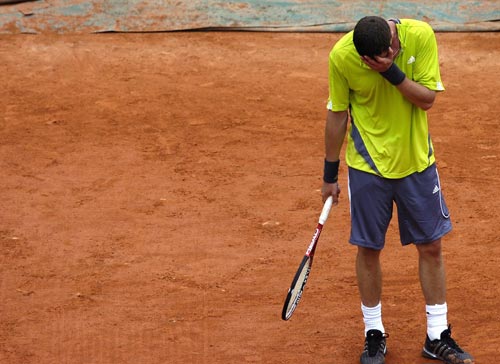




![[image]](http://i82.photobucket.com/albums/j271/davis_2006/Tennis/RG2007-30.jpg)
![[image]](http://i82.photobucket.com/albums/j271/davis_2006/Tennis/RG2007-31.jpg)
![[image]](http://i82.photobucket.com/albums/j271/davis_2006/Tennis/RG2007-32.jpg)
![[image]](http://i19.tinypic.com/4z4k74i.jpg)
![[image]](http://i13.tinypic.com/687kcb8.jpg)
![[image]](http://i9.tinypic.com/4u4po2o.jpg)
![[image]](http://i15.tinypic.com/4y9f7r5.jpg)
![[image]](http://i17.tinypic.com/4kauyqv.jpg)
![[image]](http://i14.tinypic.com/5zh5r0i.jpg)
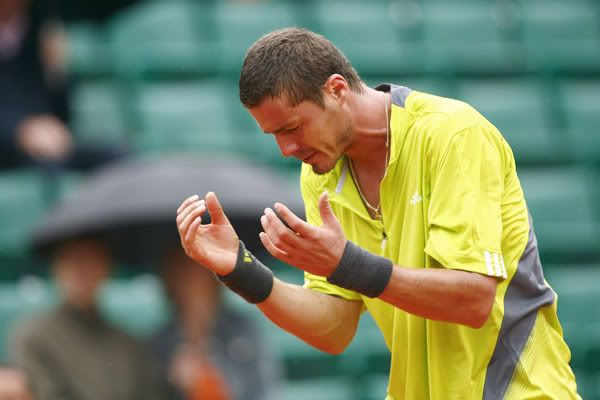

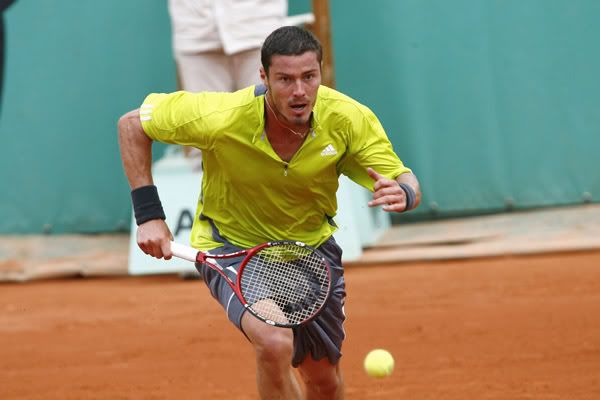
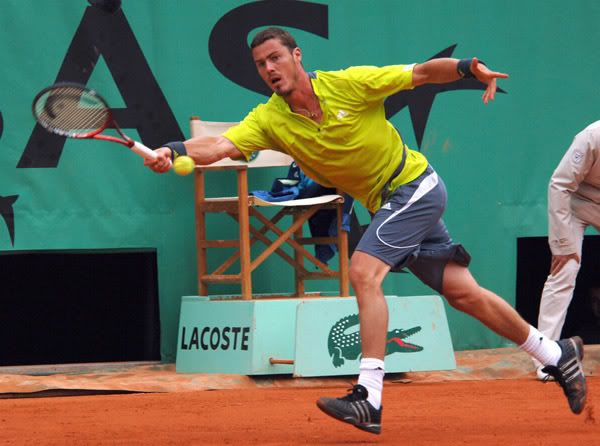
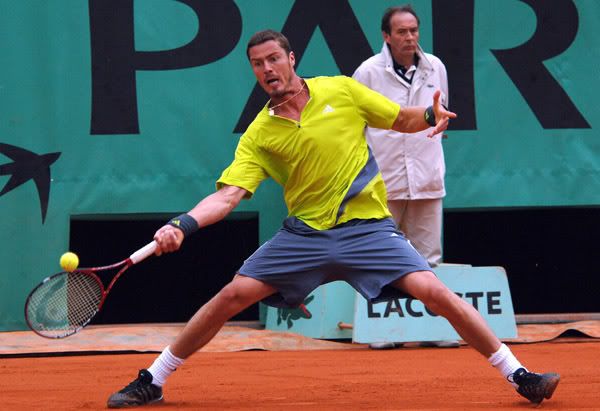
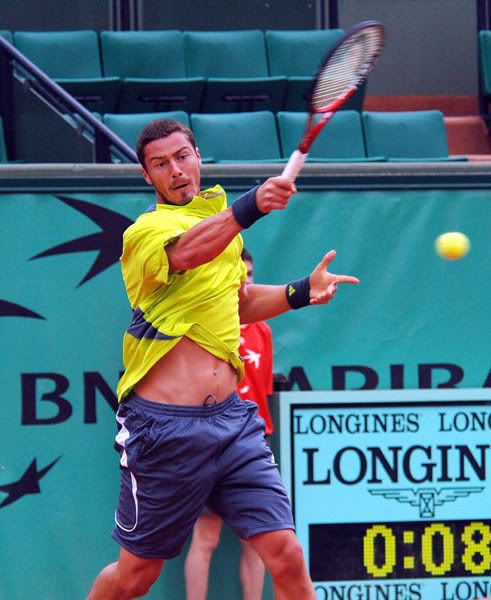
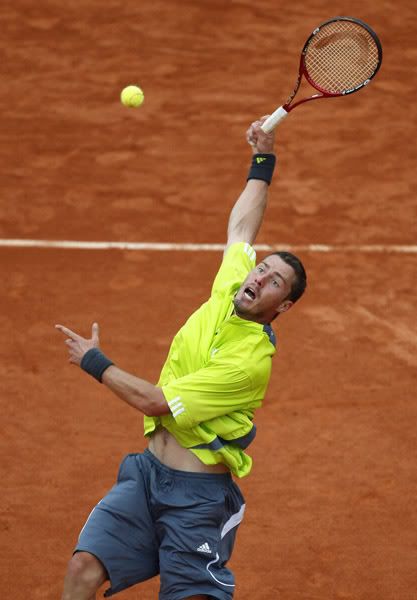
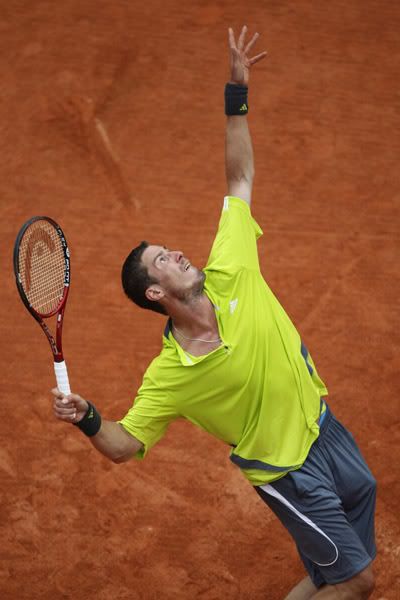
![[image]](http://i18.tinypic.com/4qs9wly.jpg)
![[image]](http://i15.tinypic.com/4vgnnz6.jpg)



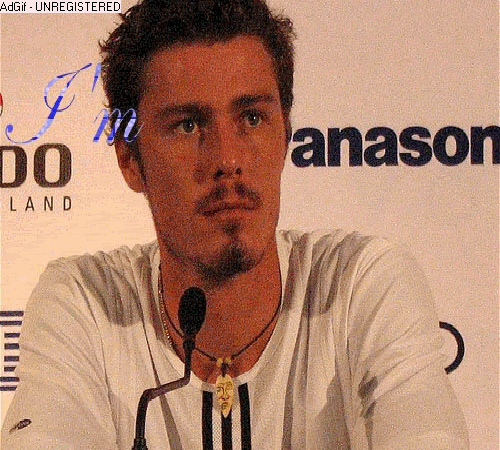


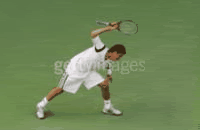
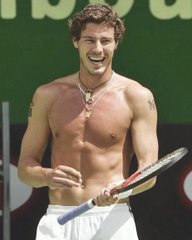



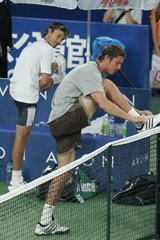


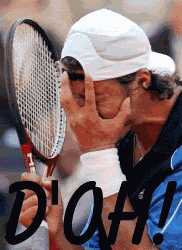
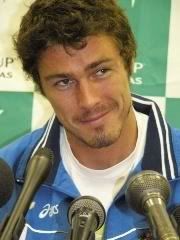





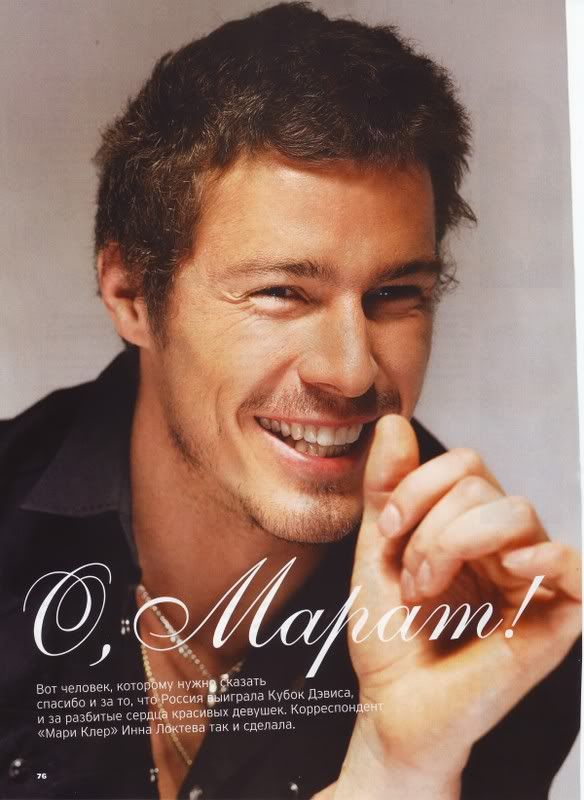
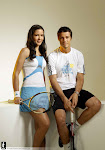
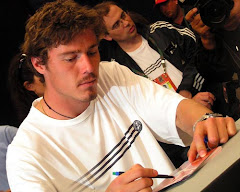
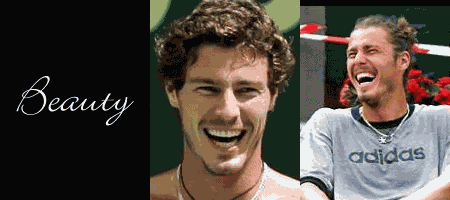


No comments:
Post a Comment